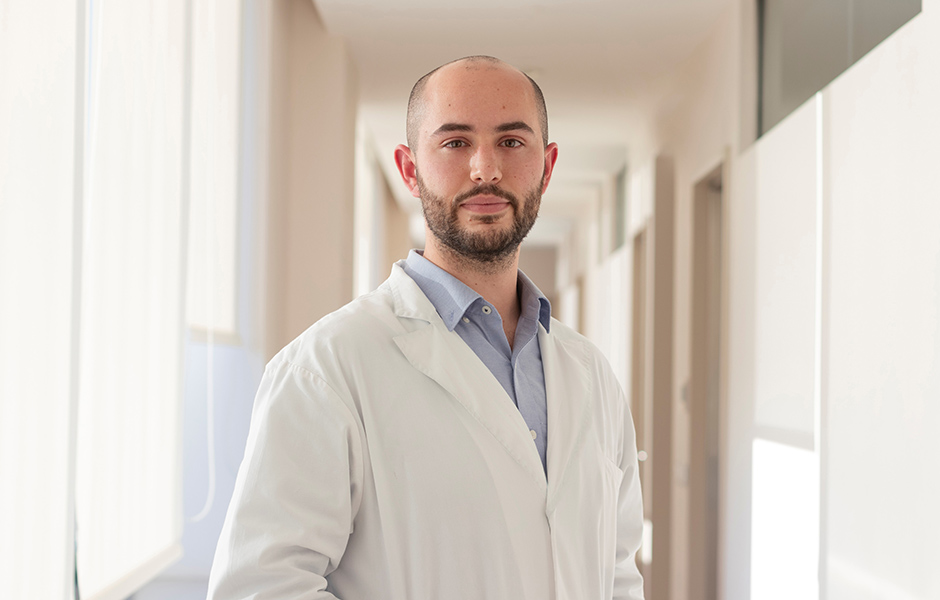Manuel Gonçalves-Pinho is one of the youngest and most promising researchers at CINTESIS, where he is part of the 2D4H research group. He was born in Porto and received his Master’s Degree in Medicine (2018) and PhD (2022) from the Faculty of Medicine of the University of Porto (FMUP), where he is a Guest Assistant in Psychiatry and Mental Health. He is also a Psychiatry doctor at the Hospital Center of Tâmega e Sousa (CHTS).
He was deeply impressed by the book “Retalhos da Vida de um Médico”, by Fernando Namora, and has always had “a fascination for treating people”. “Although I liked Portuguese very much, especially the more creative part, the Science areas always fascinated me more. I always had that fascination for healing and understanding others. I also always liked to listen to people, and in the clinic, we have that privilege”, he says.
Medicine was a natural choice, allowing him to combine teaching and research since the first year of the course, under the guidance of Alberto Freitas, principal investigator of 2D4H, CINTESIS, and professor at FMUP, who would later become his supervisor in the Integrated Master (with a thesis on termination of pregnancy) and for his PhD project. Alberto Freitas brought him to CINTESIS, where he has been developing research mainly in the areas of Public Health, Mental Health and economic analysis of health care.
In the field of Psychiatry and Mental Health, which he later chose as his medical specialty, he developed a work on eating disorders, such as anorexia nervosa and bulimia, showing that these diseases caused 4 thousand hospitalizations in 16 years.
In recent years, their work has described hospitalizations in Portugal for psychiatric diseases, such as depression and bipolar disorder, and characterized the people who are hospitalized. “We didn’t even have epidemiological data on hospitalizations in this area. We had prevalence data from 2013, but we didn’t know how many patients were admitted to Portuguese hospitals for depression, schizophrenia or bipolar disorder,” he recalls.
In this context, one of his most visible studies was about admissions in public hospitals for psychotic outbreaks associated with cannabis consumption, which has motivated lectures, publications and interviews, such as the one he gave last November to the German newspaper Die Zeit.
“The results of our articles can actually have a lot of impact on society. We have analyzed, so far, the hospitalizations, which are the end of the line, when the rest didn’t work, whether in hospital consultations or in primary health care,” he stresses.
His most recent work to be noted is on psychiatric emergencies during the pandemic of COVID-19. “This is the study with the biggest impact so far in terms of citations and visibility,” he says.
For Manuel Gonçalves Pinho, “it is important to say that secondary data comes from national databases of all public hospitals [used primarily for funding]. Secondary data have this advantage: they are a kind of fog light: they don’t allow us to see reality with great definition, but they allow us to orient and understand in which direction we should go.
The CINTESIS researcher welcomes the visibility that Mental Health has gained in recent times, reflecting the importance it has always had and dispelling meaningless myths and prejudices. “People have the idea that mental illness is contagious, almost as if it were an infection, and so they think it’s best not to talk about it. The same is true of suicide. That’s a wrong idea, and it’s harmful to patients. It’s exactly the opposite, we should talk. These studies we have been doing have allowed us to give visibility to patients and their families, with the particularity that they effectively represent our patients,” he argues.
He has won several awards, most notably the Janssen 2022 Award with a study that analyzed readmissions to hospitals due to schizophrenia, along with the In4Med Award and the 1st Prize at the Yes Meeting in 2017 for a paper analyzing data from patients with chromosomal abnormalities admitted to Portuguese hospitals.
From 2019 to 2022, he also served a term as a member of the board of the Regional Council of the North of the Portuguese Order of Doctors.
1-Year Ambition
In academic terms, I have several ongoing projects, namely on prolonged hospitalizations in the area of mental illness and on hospitalizations for neurological illness with psychiatric comorbidity. One of the problems of inpatient psychiatric services is that people who are clinically discharged but have no family or social support and no vacancy in long-term care. Without possible social orientation, these patients end up staying ad eternum in acute inpatient services.
Another ongoing work is on quality indicators for Mental Health in Primary Health Care. Psychiatry is in the hospitals, but who is in the first line of contact with the patients are the family doctors, family nurses and psychologists in the health care units. There are many quality indicators, but still very few on Mental Health.
10-Year Ambition
In the mid-term, I want to develop my connection to the FMUP. At this stage, it is very important for me to keep my academic, teaching and clinical activity together.
We are also working on the creation of a data platform for Mental Health in Portugal, which will consist of conducting national studies, linking data from national public hospitals and other health databases, as already happens in other countries. The goal is to map the reality of mental illness in Portugal in a systematic and continuous way.
Life Beyond Teaching and Research
I really enjoy engaging in activities outside of Medicine and Psychiatry, for my own Mental Health. I really like to write, it’s a form of emotional release for me. I also like music, going to the Casa da Música, and going to the Coliseu do Porto. I love the countryside, getting my hands dirty and being in touch with Nature. Besides that, I dedicate myself to my family, to my friends, to those who are close to me.

